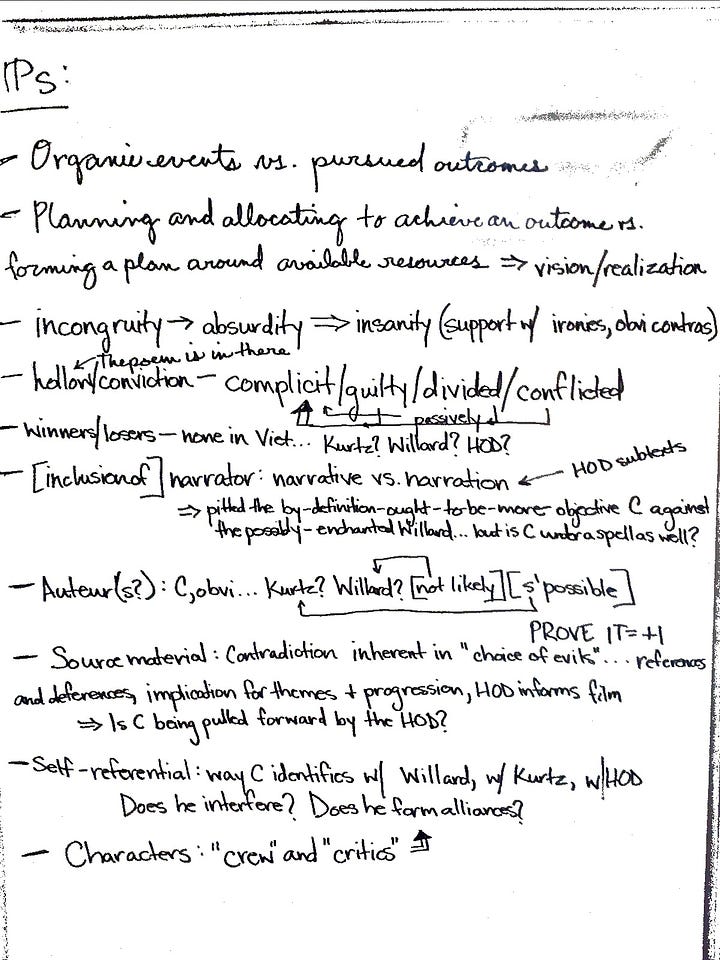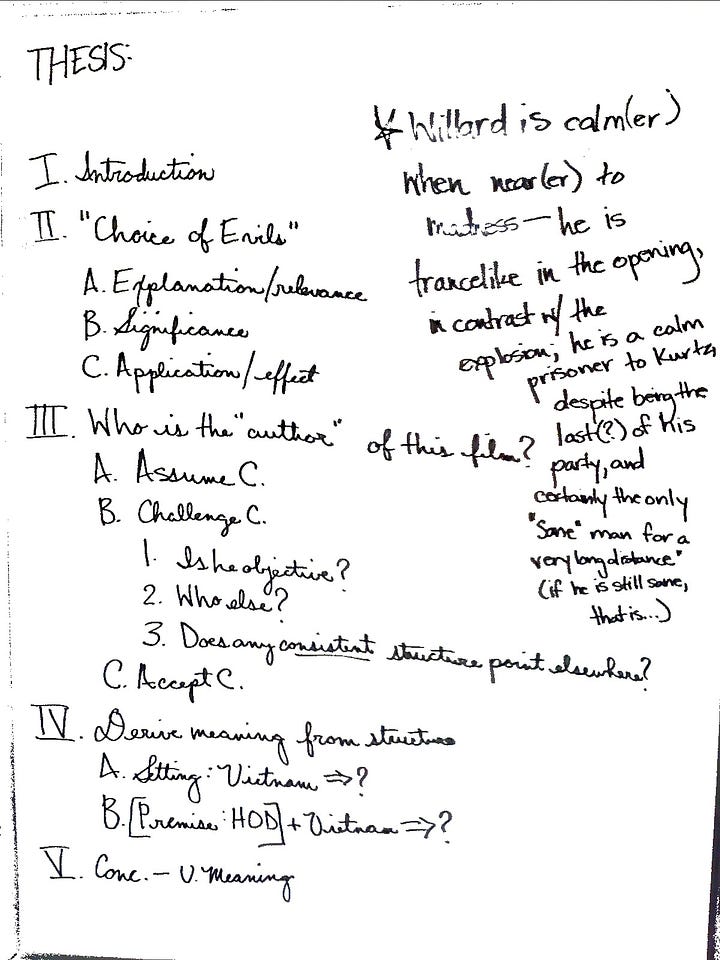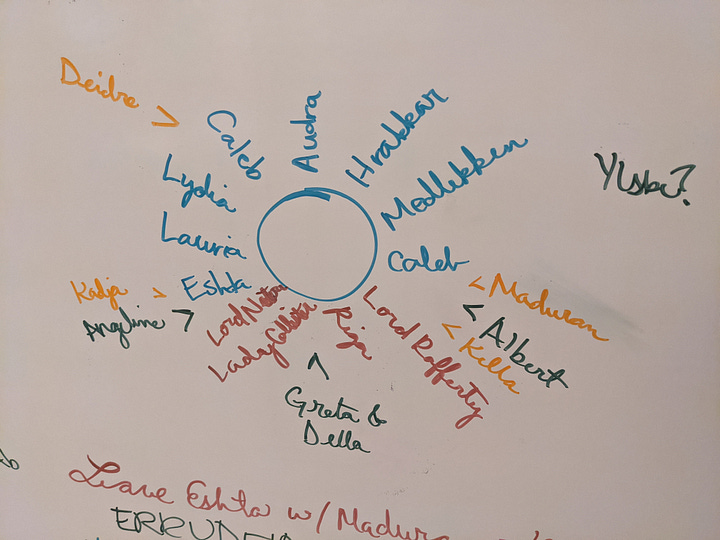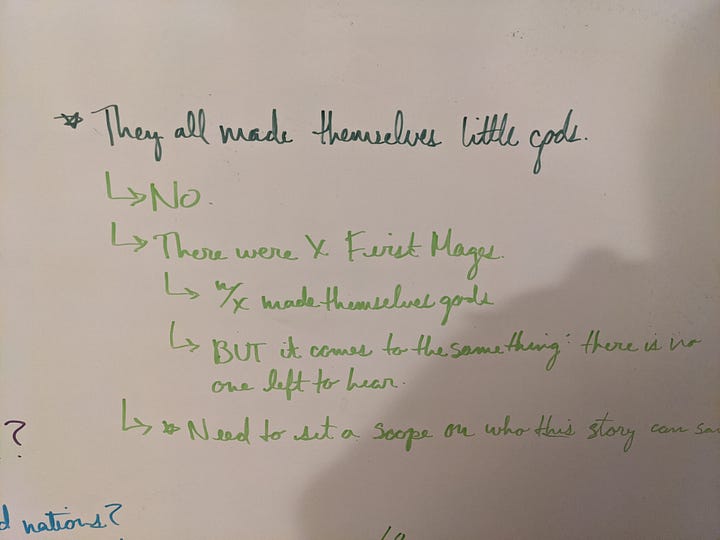One of the things I want to do with this blog is share my poetry—so far, I have not had an opportunity to do that. But when I was in college, one of my pastimes was dashing off sonnets (the expediency was an explicit component; I once wrote a sonnet during the span of an English lecture, just to prove I could). And one occasion when I most frequently indulged this pastime was when I had a paper to write.
Let me set the scene. I have a paper due at 10:40 a.m.—but I can’t miss Spanish at 9 a.m., so I only really have until then. Between 10:00 p.m. and midnight the night before, I go to the library and get the largest and grandest study room (which is empty, unless there’s an exam this week for the honors class in organic chemistry). This room is furnished in a fairly modern style, with a low, round table—white—, low, sleek office chairs, and four conjoined whiteboards, on which I will make the crazy-person notes that will become my paper.




In this room, I will research and write for the next eight-and-a-half hours, with probably a seven-to-forty-minute nap on the floor. But at some point, most likely between the researching and the writing, I will experience sheer panic at the task before me—panic that I will interpret as writer’s block and channel into a sonnet.
So, without further ado…
Study Breaks for Sonnets: “Oh! Milton—I cannot write this damn Machiavelli paper whilst you are intoning sweet iambs in my ear” Oh, Milton! Why is it I find my muse Is present only when I have ought more Calling for mine focus? —At my core, I know that all of this is just a ruse. My talent and my wiles I abuse In classifying outright as a bore All exercise of mind—all gainful chore. And God can see all this—I should recuse Myself, so fraudulent in intellect. Adapting to my mien a cunning guise— Were I to bear my thoughts to true effect, And cast off claims of merit (which are lies), Then I would find that I am not elect, Would my weak mind, my own base heart despise.
So we can see, right, that this is a Petrarchan Sonnet—the eight-line problem contains two repetitions of an ABBA rhyme scheme, and the six-line solution has a rhyme scheme of CDCDCD. I have since adopted the convention, instead, of closing with a rhyming couplet, but in all other ways, this is the sonnet form I still use.
Why sonnets? It’s an exercise—much like study sketches and practicing scales. It calls for less creativity because sonnets have a fixed structure, and working within that fixed structure gives me a guide to do some creative thinking.
Next, let’s look at a sonnet I wrote while studying for the exam that convinced me to quit Physics.1
Study Breaks for Sonnets: “It’s almost 7am,; I got up at 4:30 to take a damn Logic exam, and I’m going to fail this Physics test although I stayed up all night studying” Assume dy assigns to all things y That which dx assigns to all things x Then work is equall to kinetic E Which is but half the mass times square of v And let’s assume yet wilder that I care Then all and any consequent holds True That antecedent’s False as it can be Oh, when I fail this test, that you will see Yet even in this darkest morn—a light! That I can rhyme five iambs with no sleep That I can channel all my Physics spite Into a sonnet to make Petrarch weep. And on this dream I now conceive a wish To be allowed to crawl into my niche.
I think this might the best of my study break sonnets—it does a particular thing that I’ve been thinking about a lot lately: it contains unique word combinations (at least, within poetic form, I believe). One trend I’ve noticed among amateur poets (myself very much included) is that they will often default to cliché to fit the rhyme or rhythm. But that is especially a mistake in poetry, because (good) poems contain a higher density of meaning than prose. A cliché is inherently shallow; any space you are devoting to others’ word combinations is an opportunity you’re wasting to say something. Since I have only realized this fairly recently, it remains to be seen what effect this insight will have on my own poetry.
Finally, this is a sloppy-as-frick meditation on my experience with Shakespeare…
Study Breaks for Sonnets: “High School Drama, or Actually, I Read Fourteen Plays in High School...” Since I began at school I’ve covered these: The worlds of sixteen works of fiction meant To play upon the stage—their first intent Instead, as words upon the page they freeze And overfrosts their actions but to please The reader who dissects them to his bent Oh what such craftsmanship that is misspent By editors of great anthologies We ought admit there is no other way If ever we should understand a play Then movie it must—no, it will not forbear The static press of printers who would care For it by writing out (but pages mold) It must be on the stage that it is told. (written at 4am February 20, 2009, while trying to write a paper on “I wake and feel the fell of dark” for ENGL 200)
4am indeed. I don’t have much to say about this—I hate that it breaks the rhythm, and I dislike how vague it is.
I had planned to close this post with a better sonnet, written since my college days—but then I sat down to write a sonnet, to utilize my insight about cliché…and then I marked up my own poem like a madwoman. I present it here without comment (or, rather, with commentS).
We’ll get into my poetry opinions in time. Meanwhile, have some prompts to dissolve your writer’s block…
[If you use one of these, you simply MUST tell me; I would be DELIGHTED]
Imagine bismuth as a setting for a whole, tiny world (and look up pictures of bismuth, to understand why this might be inspiring)
Scroll through r/oddlysatisfying, and imagine one of the more abstract videos as creatures engaged in a mating dance
Imagine a world where the only way to afford therapy is through virtual sex work (and everyone knows it, and it’s, like, built into the society)
Plan out a research paper about your current pop culture obsession (that’s how you start a blog!)
And, of course, you could try writing a sonnet!


No, seriously—the professor showed a graph of where the grades fell and suggested that the three dots below a 20% score consider dropping the class. Having scored a 17, I needed no convincing.





